English CBSE Class 10 NCERT First Flight Chapter 4 From the Diary of Anne Frank Free Solution of Extra Questions and Answers – Extract Based Questions Short Answer Questions Long Answer Questions and Value Based Questions
FROM THE DIARY OF ANNE FRANK
(Extra Questions)
Extract Based Questions
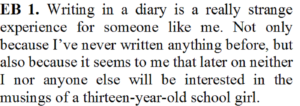

1. Who is referred as ‘I’ in the above extract?
2. Which word in the extract mean ‘thoughts’?
3. What is name of elder sister of ‘I’?
4. What did ‘I’ write in the beginning of her diary?
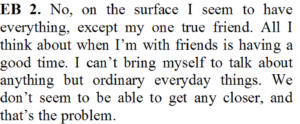

1. Which group of words in the extract mean ‘superficially’?
2. Write antonym of ‘everything’.
3. How many true friends did Anne have in her school?
4. What according Anne was the problem with her current friends?


1. Who was Anne’s long awaited friend? What was the name of this friend?
2. In reference to the extract, what is meaning of the phrase ‘to jot down’?
3. Why did Anne need a diary’?
4. Which word in the extract is antonym of ‘decrease’?
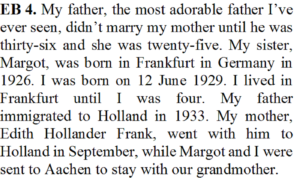

1. What was the age of Margot, when her father immigrated to Holland?
2. In which town Anne’s grandmother lived?
3. Which word in the extract is synonym of ‘loving’?
4. For how many years Anne lived in Frankfurt?


1. What was the topic of the essay?
2. What according to Anne is the main point of the essay?
3. Which word in the extract means ‘challenge’?
4. Which word in the extract is antonym of ‘gradually’?
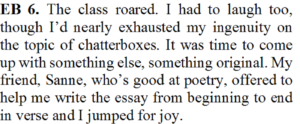

1. Why Mr. Keesing had asked her to write another essay?
2. What was new in this essay writing?
3. Why did the class roar?
4. What word in the extract is synonym of ‘creativity’?
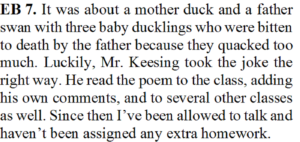

1. Why did father swan kill its three ducklings?
2. Which word in the extract mean ‘fortunately’?
3. Why Mr. Keesing allowed Anne to talk in the class?
4. What word in the extract is synonym of ‘many’?
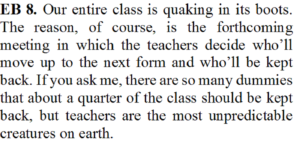

1. Why entire class was quacking in its boots?
2. What result did Anne expect for herself?
3. Which word in the extract is synonym of ‘fools’?
4. What word in the extract means ’25 percent’?
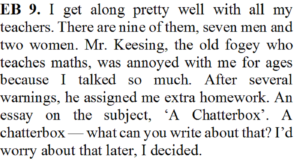

1. Why does Anne call her teacher an old fogey?
2. Which subject was taught by Mr, Keesing?
3. Which phrase in the extract is mean ‘since long time’?
4. What word in the extract means ‘afterwards’?
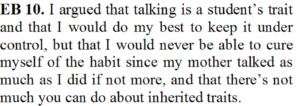

1. What would Anne try to keep under control?
2. Why would Anne not be able to cure herself?
3. Which word in the extract is antonym of ‘always’?
4. What word in the extract means ‘qualities’?
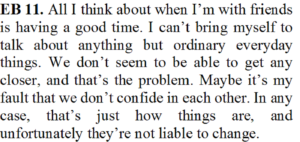

1. What can Anne think about his friend?
2. Explain ‘unfortunately they’re not liable to change?
3. Which word in the extract is antonym of ‘special’?
4. What word in the extract means ‘mistake’?
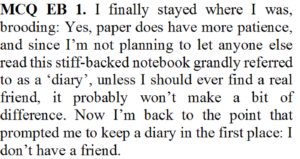

(i) Where did the author finally stay?
(a) at her hostel
(b) at her home
(c) at her school
(d) at her hotel
(ii) Which of the following word is not similar the word ‘grandly’ as used in the extract?
(a) proudly
(b) arrogantly
(c) humbly
(d) haughtily
(iii) Based on the extract please classify following as fact and opinion?
- Anne eventually decided where she should be staying
- Anne should make a plan to share her diary with everyone
- Anne did not have a real friend
- I have a doubt if paper has more patience
(a) F – 1,3 and O – 2,4
(b) F – 1,2 and O- 3,4
(c) F -1,4 and O – 2,3
(d) F – 2,3 and O – 1,4
(iv) Which of the following correctly represents condition of Anne described in the extract
(a) joyous
(b) lonely
(c) sorrow
(d) unmindful
(v) Which of the following is true about the diary
(a) it was stiff backed notebook
(b) it was started because Anne did not have any friend
(c) Anne planned to allow her real friend to read her diary
(d) All the above
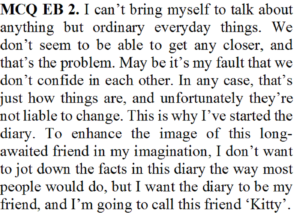

(i) ‘We don’t seem to be able to get any closer’. To whom does the word ‘we’ refer to in this sentence?
(a) Anne and her sister
(b) Anne and her aunt
(c) Anne and her friends
(d) Anne and her mother
(ii) ‘unfortunately they’re not liable to change’. Which characteristic of Anne is expressed though this sentence?
(a) anger
(b) resignation
(c) recklessness
(d) embarrassment
(iii) Which of the following is not true about the diary?
(a) Anne wanted to enhance its image
(b) Anne did not want to write about routine facts in the diary
(c) Anne wanted it to be her real friend
(d) Anne wanted to write it the way most people write
(iv) Based on the extract please classify following as fact and opinion
- Anne had a doubt that she did not have any real friend
- Anne named her diary ‘Kitty’
- Anne believed that she never got closer to her friend
- I think never tried to be close to her friends
(a) F – 1,2 and O – 3,4
(b) F – 1,3 and O – 2,4
(c) F – 1,2,3 and O- 4
(d) F – 2,3 and O – 1,4
(v) Which of the following is not implied by the phrase ‘long-awaited friend in my imagination’?
(a) Anne was eager to have a friend
(b) Anne missed that none was her friend
(c) Anne did not bother about having a friend
(d) Anne imagined having a friend
(vi) ‘I can’t bring myself to talk about anything’. Which of the following is not the correct use of phrase ‘bring myself to’?
(a) I can’t bring myself to dream about anything
(b) I can’t bring myself to be happy about anything
(c) I can’t bring myself to sad about anything
(d) I can’t bring myself to write about anything
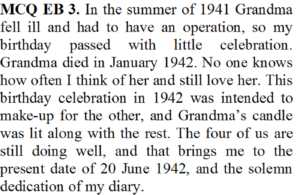

(i) How long grandmother of Anne was sick?
(a) one year
(b) less than a year
(c) more than a year
(d) none of the above
(ii) What was done in 1942 to pay homage to grandmother?
(a) Anne’s birthday was not celebrated
(b) An extra candle was lit
(c) Anne observed two minute silence
(d) Anne still loved her grandmother
(iii) Which of the following does not represent that Anne loved her grandmother?
(a) She often thought about her
(b) Her birthday in 1941 passed with little celebrations
(c) She lit an extra candle in memory of her grandmother
(d) She started writing a diary
(iv) In which year Anne started writing her diary?
(a) 1941
(b) 1942
(c) 1943
(d) 1944
(v) Based on the extract please classify following as fact and opinion
- In 1942 Anne celebrated her birthday after death of her grandmother
- Anne should not have hidden her love towards her grandmother
- Anne could have started writing diary a bit earlier
- In 1941 Anne’s grandmother had undergone an operation
(a) F – 1,2 and O- 3,4
(b) F – 1,4 and O- 2,3
(c) F – 1,3 and O -2,4
(d) F – 2,4 and O- 1,3
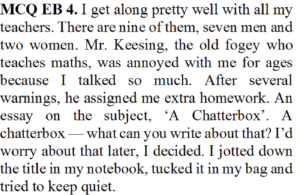

(i) Which of the following is a correct statement?
(a) there were seven males teachers
(b) there were two female teachers
(c) in all there were nice teachers
(d) all the above
(ii) What would the expression ‘Mr. Keesing was annoyed with me for ages’ means?
(a) Keesing was annoyed with me because of his age
(b) Keesing was annoyed with me since very long time
(c) Keesing was annoyed with me because of my age
(d) Keesing was annoyed with me because of age of others
(iii) Based on the extract please classify following as fact and opinion
- Keesing was an old fashioned teacher.
- A teacher should keep up with the latest trends
- Anne talked too much in the class
- In my opinon Mr. Keesing did not believe in giving warning to students
- Keesing had a creative way of punishing his students
(a) F – 1, 3, 5 and O- 2,4
(b) F – 1,2,5 and O- 3,4
(c) F – 1,5 and O- 2,3,4
(d) F – 1,4 and O- 2,3,5
(iv) Through the expression ‘what can you write about that?’ Anne wants to say that she became
(a) careless
(b) puzzled
(c) annoyed
(d) angry
(v) Which of the following does not correspond to ‘jotted down’?
(a) noted down
(b) wrote down
(c) scribbled down
(d) dribbled down
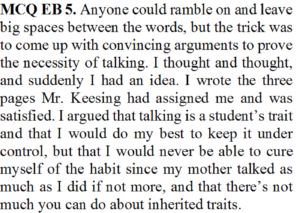

(i) Which characteristic of Anne is displayed when she says that ‘the trick was to come up with convincing arguments’?
(a) perseverance
(b) creativity
(c) negativity
(d) humility
(ii) Based on the extract please classify following as fact and opinon.
- Anne wanted to write a good essay
- Anne’s argument was quite novel
- Anne wrote a three page essay
- Anne assured to try her best to her talking under control
- Anne was quite confident that she would control her habit
(a) F – 1,2,3 and O- 4,5
(b) F – 1,3,4 and O- 2,5
(c) F – 1,2,5 and O- 3,4
(d) F – 1,3,5 and O- 2,4
(iii) The expression ‘I thought and thought’ represents that
(a) Anne though very hardly
(b) Anne thought very hard
(c) Anne thought very broad
(d) Anne thought so much that she got bored
(iv) In the expression ‘talking is a student’s trait’ the word ‘trait’ does not correspond to which of the following
(a) quality
(b) characteristic
(c) feature
(d) right
(v) According to extract why would Anne not be able to cure her habit of talking?
(a) she did not to cure her habit
(b) she thought it was her right to talk
(c) she had inherited the habit of talking
(d) she had this special trait of writing essay
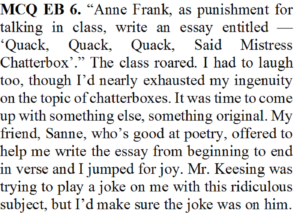

(i) Which of the following immediately came to mind of Anne when she was asked to write an essay?
(a) I had exhausted all mu ingenuity
(b) It was the time to come with something else
(c) She thought of writing something original
(d) All the above
(ii) ‘The class roared’. Which of the following does not correspond to the word ‘roared’?
(a) laughed loudly
(b) shouted loudly
(c) smiled loudly
(d) screamed loudly
(iii) Who offered to help Anne?
(a) Anne herself
(b) Her classmate
(c) Her mother
(d) Her teacher
(iv) Based on the extract please classify following as fact and opinion.
- I believe Anne enjoyed writing essays
- This time Anne was at the loss of ideas to write essay
- Anne should have voluntarily asked for help.
- This time Anne decided to write the essay in verse
(a) F – 1,2 and O- 3,4
(b) F -2,4 and O- 1,3
(b) F – 1,4 and O – 2,3
(c) F – 2,3 and O- 1,4
(v) ‘Mr. Keesing was trying to play a joke on me with this ridiculous subject, but I’d make sure the joke was on him.’ Which characteristic is displayed by Anne through this sentence?
(a) jealousy
(b) determination
(c) aggression
(d) humility
Short Answer Questions (30-40 words)


Answer: We can write our feelings and thoughts on paper. The paper neither reacts to it nor responds to it. One can say that paper faithfully listens to what is being told to it. We can correct or overwrite what was written earlier.
But people would always react or respond to what is told to them.
Hence Anne says that papers has more patience.


Answer: She had an adorable father. She had loving aunts and a good home. Margot was her elder sister. When her parent moved to Holland she had stayed with her grandmother. She joined her parents after some years. She loved her grandma.


Answer: Sanne was a classmate and a friend of Anne. She helped Anne write the entire essay in verse. The poem turned out to be a very good verse. Her teacher was impressed and allowed her to talk in the class.


Answer: Anne did not want to write facts in her diary as most people do. She wanted to write her feelings and thoughts in it. She wanted to confide with it and treat it as her friend. She had lovingly called it ‘Kitty’.


Answer: Mrs. Kuperus was her teacher in school. Anne had developed deep bonding with her. Hence when Anne left the school she was in tears.


Answer: The teachers decide who will move up and who will remain in the same class.
The mood of the teachers cannot be assessed by a student. This is evident from the essays Mr Kesing gave to Anne. He eventually allowed her to talk in the class.
Therefore Anne said that teachers are most unpredictable creature.


Answer: The final essay was written in the form of a poem. In that poem the father swan killed his three ducklings because they quacked a lot. This deeply affected Mr. Keesing, and he allowed Anne to talk in the class.
Long Answer questions (120-150 words)


Answer: Anne had many classmates. But she could not confide with any of them. She could not call any of them as her true friend. She does not entirely blame her friends for such situation. Probably she could not gather enough courage to speak her feelings. Or she feared about response of her friends.
On the contrary, one can express his / her feeling through writing any form of literature. The paper silently absorbs our thoughts. It is possible to make corrections and further improvise our own writings. Such liberty is not available through dialogue.
This aspect is illustrated through essays Anne wrote. Every essay revolved around one central theme. Each was an improvement over the previous essay. Finally her teacher Mr. Keesing was so impressed that he allowed her to talk in the class. Such a situation cannot be achieved through dialogue.
Hence paper has more patience than people.


Answer: Anne describes anxiety of students about moving up to next class. She clearly talks about jovial atmosphere prevailing in the class. Students appear to be friendly and supportive to each other. A friend helped Anne in writing essay in verse.
One of her teachers Mr. Keesing is disturbed because Anne talked a lot in the class. He gave Anne extra homework to write an essay. This is an innovative way of maintaining discipline that would result into learning for a student. And the student has a chance to express herself.
Creativity of student was promoted through altering the topic a bit and still maintaining the same theme. Eventually the teacher gets so impressed that Anne was allowed to talk in the class. This speaks volumes about goodness of teacher.
Thus atmosphere in class was friendly. It promoted creativity. Teachers were considerate towards feelings of students.


Answer: Mr Keesing had punished Anne in a very innovative method. By asking her to write an essay he was trying to employ creativity of the student. He wanted Anne to understand importance of maintaining discipline in the class. At the same time he was giving an opportunity to express herself.
But Anne did not understand importance of discipline after writing first essay. So he gave her next essay on similar theme. Yet another essay was given on similar theme. This time Anne wrote a poem. In which she talked about a father swan who killed his ducklings because they quacked a lot.
Now Keesing understood that Anne took him as a fatherly figure and expected him to take care of her natural traits. Keesing allowed Anne to talk in the class.
Thus we can say that Keesing was full of empathy and sympathy. He believed in honouring thoughts of student.


Answer: At the tender age of 13, Anne could differentiate between an ordinary friend and a true friend. She had the urge to express her feelings. Thus she decided to write a diary. Such thoughts certainly represent that Anne was a mature person.
Mr Keesing gave her an assignment of writing an essay on the topic ‘A Chatterbox’. She avoided to ramble on but wrote with creativity. Even her teacher and the class had a good laugh. Her third essay was in the form of a poem. She narrated that a father swan killed his three ducklings because they were quacking too much. The teacher was so touched that he allowed her to talk in the class. These arrays of essays speak volumes about her creativity.
Thus we can say that Anne was a matured and creative person.
****
AMANDA
(Extra Questions)
Extract Based Questions


1. What three instructions Amanda received in the above extract?
2. Which word in the extract mean ‘to bend’
3. Which poetic device is used in ‘Stop that slouching and sit up straight’?
4. Which word in the extract is antonym of ‘begin’?


2. Which word in the extract is synonym of ‘only’?
3. What does Amanda want to be?
4. Which poetic device is used in ‘emerald sea’?


1. Which word in the extract is synonym of ‘complete’?
2. For which work the speaker is reminding Amanda?
3. Which poetic device is used in ‘Did you finish your homework’?


1. What does Amanda want to be?
2. Which word in the extract mean ‘moving’?
3. Which poetic device is used in ‘the freedom is sweet’?
4. Which word in the extract mean ‘naked’?
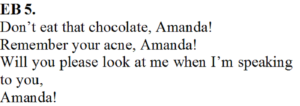

1. According to speaker, why Amanda should not eat chocolate?
2. Who is referred as ‘you’ in the above extract?
3. Which word in the extract mean ‘recall’?
4. What word in the extract mean ‘consume’?


1. Which poetic device is used in ‘I am Rapunzel, I have not a care’?
2. What does the speaker think about life at tower?
3. Who was Rapunzel’?
4. Which word in the extract is synonym of ‘shining’?


1. Which poetic device is used in ‘stop that sulking at once’?
2. Which phrase in the extract mean ‘immediately’?
3. Which word in the extract is antonym of ‘appreciated’?
4. Name the poet of above extract.
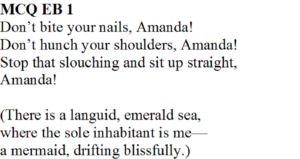

(i) Amanda’s mother is scolding Amanda for
(a) biting her nails
(b) hunching her shoulders
(c) to sit up straight
(d) both (a) and (b)
(ii) Amanda’s mother advices Amanda to
(a) to stop slouching
(b) to sit straight
(c) to behave properly
(d) both (a) and (b)
(ii) Why does Amanda want to live sea?
(a) she wants to live alone
(b) she wants to swim
(c) she loves colour of sea water
(d) all the above
(iii) According to the extract, colour of sea is
(a) grey
(b) colourless
(c) green
(d) mermaid
(iv) What is a mermaid?
(a) An imaginary person
(b) an imaginary bird
(c) an imaginary insect
(d) an imaginary creature
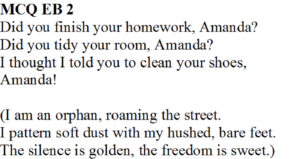

(i) What did her mother ask Amanda to do?
(a) finish homework
(b) tidy the room
(c) clean shoes
(d) all the above
(ii) Which poetic device has been used if first two line are considered together?
(a) alliteration
(b) repetition
(c) anaphora
(d) metaphor
(iii) Amanda wants to be an orphan because she thinks that
(a) silence is golden
(b) freedom is sweet
(c) either (a) or (b)
(d) both (a) and (b)
(iv) As an orphan which of the following activities Amanda does not want to do?
(a) draw pattern on soft soil
(b) roam around freely
(c) to talk freely
(d) remain bare foot
(v) Which of the following word does not have a meaning similar to that of ‘pattern’?
(a) arrangement
(b) configuration
(c) figure
(d) size
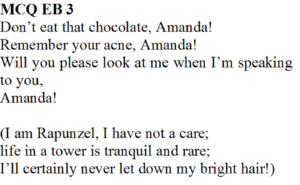

(i) What may happen if Amanda eats chocolate?
(a) she may get stomach upset
(b) she may get headache
(c) she may get fever
(d) she may get acne
(ii) Amanda wants to live in a tower because she thinks it would be
(a) unusual
(b) peaceful
(c) both (a) and (b)
(d) neither (a) nor (b)
(iii) Amanda decides that when she is in the tower, she will
(a) always keep her hair down
(b) always comb her hair
(c) never keep her hair down
(d) she would not look after herself
(iv) Which of the following word is not a synonym of ‘tranquil’?
(a) quiet
(b) quite
(b) peaceful
(c) calm
(iv) Who is the author if the poem from which above extract has been taken?
(a) Anne Frank
(b) Robin Klein
(c) HG Wales
(d) Robert Frost
Short Answer Questions (30-40 words)


Answer: Earlier when Amanda had eaten chocolate, she had got acne. Her mother reminds her of this previous incident and stops her from eating chocolate.
Amanda does not look at the speaker while receiving the advice. She seems to be ignoring the advice.


Answer: No. Giving instructions to Amanda did not serve any purpose. She did not like to receive instructions. She wanted to lead a life of freedom and silence.


Answer: Rapunzel had long hair. She had let down her hair so that a prince could rescue her.
But Amanda wanted to live alone. She did not want to be disturbed by anyone. So she did not want to let down her hair.


Answer: Poet wants to convey that too many instructions to children serve no purpose. Children may get irritated and may start daydreaming of living alone.
So parents should be careful while mentoring children. They should point out good things also about their children.


Answer: She thinks that an orphan is free to roam about in the streets. She can draw pattern in soft dust using her bare feet. There will not be anyone around to nag her. She thinks that silence is golden and freedom is sweet.


Answer: The speaker, her mother, asks Amanda to stop sulking. Mother says that Amanda is always moody.
Mother asks Amanda to stop sulking because otherwise people will think she is nagging at Amanda.


Answer: Amanda does not like to be advised repeatedly. There seems to be an advice for every activity. She feels that she is being nagged.
Hence she is moody most of the time.
Long Answer questions (120-150 words)


Answer: I am writing this from the perspective of a teenager. I am myself a teenager hence my views would be more realistic.
At this age a child develops better bonding with friends. Mingling among friends means free flow of views, play and carefree attitude. Our mind demands more freedom to develop our own thought.
On the contrary, parents try to exercise more control on children. Restriction for movements are imposed. Their own thoughts are forced upon children. Views of children are mercilessly rejected. Such contrasting attitude between children and elders leads to friction and disobedience.
At this age children want to be guided not controlled. Parents should invite kids for a discussion. It is very important to listen to views of kids. Parents should add their wisdom to thoughts of kids to make a better recipe of life. A free flow of two way communication is a must.
Being an advisor rather than a controller would provide better mentoring to children.


Answer: Amanda is a teenage girl. In the guise of cultivating better habits, she is being advised about almost everything she does. She is being advised how to sit. She is advised not to eat chocolate. She is reminded about cleaning her room, cleaning her shoes and for completing her homework.
Amanda considers these reminders as a nagging at her. She is annoyed and depressed. She feels that she is also a responsible person and knows her duties and works. But she is not is a position to disobey any of the advice.
She yearns for some freedom, some space for herself. She feels trapped among numerous instructions. There is no scope for her own thoughts and creativity.
She tries to find an escape through her imagination. Therefore she starts daydreaming about situations which would give her peace. She dreams of being at a place where she would be free to do what she likes.
****


0 Comments